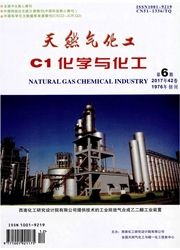

 中文摘要:
中文摘要:
Co-based catalysts were prepared by using dielectric-barrier discharge (DBD) plasma as an alternative method to conventional thermal calcination. The characterization results of N2-physisorption, temperature programmed reduction (TPR), transmission electron microscope (TEM), and X-ray diffraction (XRD) indicated that the catalysts prepared by DBD plasma had a higher specific surface area, lower reduction temperature, smaller particle size and higher cobalt dispersion as compared to calcined catalysts. The DBD plasma method can prevent the sintering and aggregation of active particles on the support due to the decreased treatment time (0.5 h) at lower temperature compared to the longer thermal calcination at higher temperature (at 500℃ for 5 h). As a result, the catalytic performance of the Fischer-Tropsch synthesis on DBD plasma treated Co/SiO2 catalyst showed an enhanced activity, C5+ selectivity and catalytic stability as compared to the conventional thermal calcined Co/SiO2 catalyst.
 英文摘要:
英文摘要:
Co-based catalysts were prepared by using dielectric-barrier discharge (DBD) plasma as an alternative method to conventional thermal calcination. The characterization results of N2-physisorption, temperature programmed reduction (TPR), transmission electron microscope (TEM), and X-ray diffraction (XRD) indicated that the catalysts prepared by DBD plasma had a higher specific surface area, lower reduction temperature, smaller particle size and higher cobalt dispersion as compared to calcined catalysts. The DBD plasma method can prevent the sintering and aggregation of active particles on the support due to the decreased treatment time (0.5 h) at lower temperature compared to the longer thermal calcination at higher temperature (at 500~C for 5 h). As a result, the catalytic performance of the Fischer-Tropsch synthesis on DBD plasma treated Co/Si02 catalyst showed an enhanced activity, C5+ selectivity and catalytic stability as compared to the conventional thermal calcined Co/SiO2 catalyst.
 同期刊论文项目
同期刊论文项目
 同项目期刊论文
同项目期刊论文
 Thermal decomposition and cobalt species transformation of carbon nanotubes supported cobalt catalys
Thermal decomposition and cobalt species transformation of carbon nanotubes supported cobalt catalys Performance of Cobalt-Based Fischer-Tropsch Synthesis Catalysts Using Dielectric-Barrier Discharge P
Performance of Cobalt-Based Fischer-Tropsch Synthesis Catalysts Using Dielectric-Barrier Discharge P Preparation and Characterization of Co-Based Catalyst via Dielectric-Barrier Discharge Plasma Decomp
Preparation and Characterization of Co-Based Catalyst via Dielectric-Barrier Discharge Plasma Decomp Effect of carbon support on Fischer-Tropsch synthesis activity and product distribution over Co-base
Effect of carbon support on Fischer-Tropsch synthesis activity and product distribution over Co-base A zirconium modified Co/SiO2 Fischer-Tropsch catalyst prepared by dielectric-barrier discharge plasm
A zirconium modified Co/SiO2 Fischer-Tropsch catalyst prepared by dielectric-barrier discharge plasm Fuel production through Fischer-Tropsch synthesis on carbon nanotubes supported Co catalyst prepared
Fuel production through Fischer-Tropsch synthesis on carbon nanotubes supported Co catalyst prepared Fischer-Tropsch performance of SiO2 supported Co-based catalyst prepared by hydrogen dielectric-barr
Fischer-Tropsch performance of SiO2 supported Co-based catalyst prepared by hydrogen dielectric-barr 期刊信息
期刊信息
